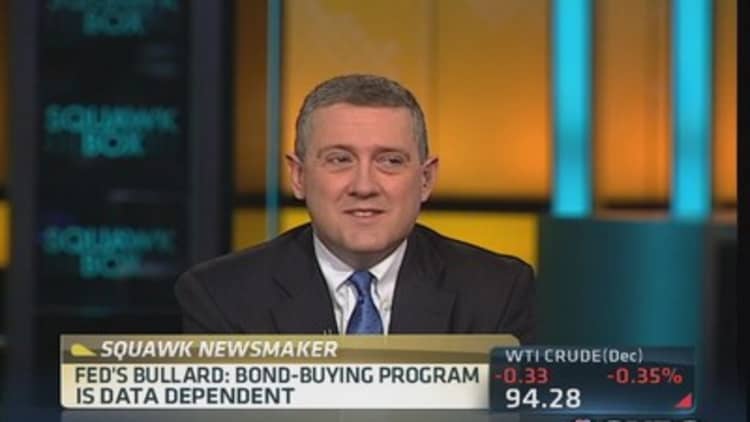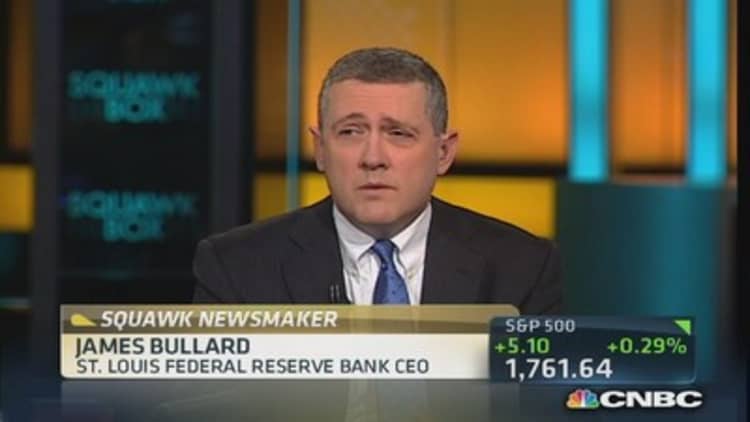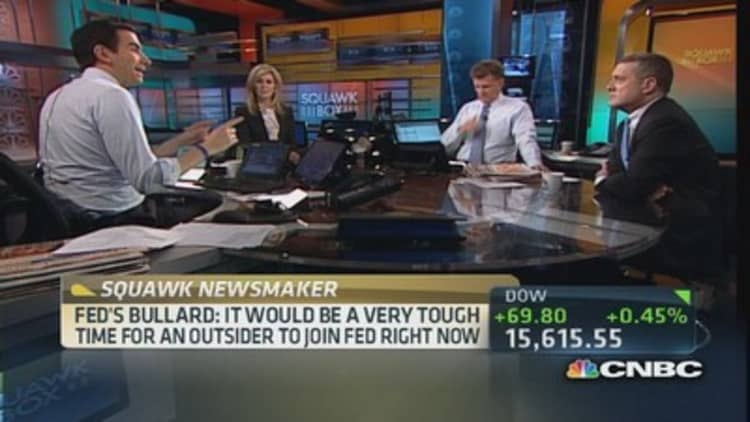
The Federal Reserve's current $85-billion-a-month in bond purchases is a "torrid pace," St. Louis Fed President James Bullard told CNBC on Monday.
But he added in a "Squawk Box" interview, "It's a very reasonable thing to do to substitute for the fact that you can't lower interest rates any further."
"Eighty-five [billion dollars] is a torrid pace, I will give you that. And a trillion dollars a year is a torrid pace," acknowledged Bullard, a Fed voting member this year. "I'd rather get out it if we can, but I'd like to meet our goals."
(Read more: Fed taper in 2014? That's just 'wishful thinking')

One of those goals has been improvement in the U.S. labor market. "The unemployment rate is down almost a full point from when we start this program in September 2012. We've had faster job growth," he said. "Every jobs report that continues to show more jobs being created and a tick down in the unemployment rate is going to make the probability of a taper go up."
There's been "substantial progress" in job creation, Bullard said, but also noted that inflation remains low. "[So] what's the hurry" to taper the asset purchase program, known as quantitative easing. He would like inflation to head back toward 2 percent.
He also said he sees "room on the balance sheet," which is approaching $4 trillion. "If you look at the size of the balance sheet relative to GDP, who's got the biggest one, Japan, Europe, U.K., U.S.? We're fourth out of those guys," he continued. "If something bad is going to happen ... with the balance sheet, these other central banks should have passed that and already had that experience and they haven't."
But the more hawkish Philadelphia Fed President Charles Plosser, appearing on the show Friday, argued that specific dollar limits should be put on the size of the balance sheet. He'll be a voting member at the Fed in 2014.
Meanwhile, Dallas Fed President Richard Monday that an ineffective, fractious, and fiscally irresponsible government has slowed the U.S. economic recovery and counteracted the stimulative effects of Fed's super-accommodative monetary policy. Fisher will be a voting member at the Fed next year.
The Fed took no action at its October meeting, after surprising Wall Street in September by not scaling things back, which raised questions about why policymakers teed-up tapering and didn't pull the trigger. "I think we enhanced credibility at the September meeting, because we showed that we were reacting to data," Bullard countered, but said it was a close call.
Explaining the circumstances then, he explained, "The 10 year [Treasury] had gone up to close to almost 300 basis. I think that was a surprise to many on the committee. It's since pulled back, but that was a big issue going on at that time."
The run-up to what turned to be the first government shutdown in 17 years had also been a consideration. But in the end, the 16-day shutdown won't have a big impact on economic growth, he said—warning that the Fed "can't really wait for the political situation in Washington to be just right, because evidently they're going to be bickering forever here."
Monetary policymakers are set to hold their final meeting of the year on Dec. 17 and 18—followed by the release of a summary of their economic projections and what will presumably be the last scheduled news conference from outgoing Fed Chairman Ben Bernanke.

President Barack Obama has chosen Fed Vice Chair Janet Yellen to succeed Bernanke, who's stepping down at the end of his second four-year term on Jan. 31. Yellen, ahead of her confirmation, is expected to meet this week with Republicans who may oppose her nomination.
Bullard said he believes "very little" would change under Yellen's leadership, because she's helped craft the current course for monetary policy. It would be a "very tough time" for an outsider to head the Fed, he contended.
Any evidence of asset bubbles could sway the Fed to change course, he said. "Tech bubble was blindingly obvious. And the housing bubble also [was] blindingly obvious," Bullard said. "The question is how should the Fed react to those very huge bubbles? I don't see anything of that magnitude going on right now."
—By CNBC's Matthew J. Belvedere. Follow him on Twitter @Matt_SquawkCNBC.


